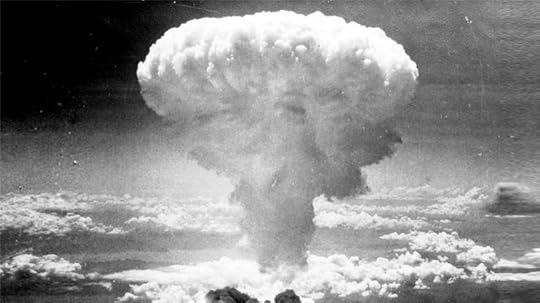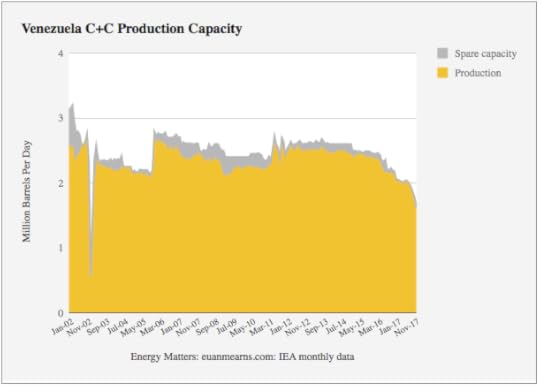Steve Bull's Blog, page 1200
February 6, 2018
The Increasing Likelihood Of Nuclear War Should Straighten Out All Our Priorities

A Russian pilot has been killed by US-armed terrorists in Syria. The Ron Paul Institute‘s Daniel McAdams writes the following about this new development:
“The scenario where a US-backed, US-supplied jihadist group in Syria uses US weapons to shoot down a Russian plane and then murders the pilot on the ground should be seen as a near-nightmare escalation, drawing the US and Russia terrifyingly closer to direct conflict.”
McAdams is not fearmongering; he is stating a plainly obvious fact. The Trump administration has just announced that it is restructuring its nuclear weapons policy to take a more aggressive stance toward Russia than that which was held by the previous administration. This is coming after this administration’s decision to arm Ukraine against Russia, a move Obama refused to take for fear of escalating tensions with Moscow, as well as its decision to continue to occupy Syria in order to effect regime change, along with numerous other escalations. The Council on Foreign Relations, which is without exaggeration as close to the voice of the US establishment as you can possibly get, is now openly admitting that the “United States is currently in a second Cold War with Russia.”
In a recent interview with The Real News, leading US-Russian relations expert Stephen Cohen repeated his ongoing warning that “this new Cold War is much more dangerous, much more likely to end in Hot War, than was the 40-year of Cold War, which we barely survived.” In a previous interviewwith the same outlet, Cohen elaborated more extensively:
…click on the above link to read the rest of the article…
February 5, 2018
US Foreign Policies Remain Unchanged Since 1948

US Foreign Policies Remain Unchanged Since 1948
Ever since 1948, the US Government’s foreign policies have been consistently focused upon breaking up the Soviet Union and turning its Warsaw Pact allies against the Soviet Union; and, then, once that would be (and was) accomplished, turning any remaining allies of Russia against Russia; and, then, once that will have been accomplished, conquering Russia. Since at least 2006, US ‘defense’ policy has been that nuclear war will be an acceptable way to conquer Russia if lesser measures fail to do the job. (Since 2006, the concept that a nuclear war between the US and Russia would result in “mutually assured destruction,” or “MAD” — a war that both parties to it would lose — has been rejected at the highest levels of the US Government, but continues unchanged as being the policy at the highest levels of Russia’s Government, which are terrified of the US Government’s attempts to develop anti-ballistic missiles and other systems that would eliminate Russia’s defenses — i.e., ability to retaliate — against a US nuclear first-strike attack — terrified at the US Government’s preparations to win a nuclear war.)
When the Republican US Presidential candidate Mitt Romney said on 26 March 2012 that, “Russia, this is, without question, our number one geopolitical foe”, he was actually stating publicly something that US President Barack Obama secretly agreed with and had been working since day-one of his Presidency to implement — and his State Department had secretly already been drawing up plans since 2011 to overthrow the Moscow-friendly leaders of two nations: Syria’s Bashar al-Assad and Ukraine’s Viktor Yanukovych. But Obama (who was the most gifted liar in US Presidential history, and really understood how to use truths to demolish even lies that his own policies were secretly based upon — simultaneously criticising bad polices while secretly implementing them) responded to Romney’s statement of March 26th, by saying on 22 October 2012, “Gov. Romney, I’m glad that you recognize that al-Qaida is a threat, because a few months ago when you were asked what’s the biggest geopolitical threat facing America, you said Russia, not al-Qaida.
…click on the above link to read the rest of the article…
America the Pariah
 Female masked members of the Al-Quds Brigades, the military wing of the Palestinian Islamic Jihad group, protest President Trump’s decision to recognize Jerusalem as Israel’s capital. (Adel Hana / AP)
Female masked members of the Al-Quds Brigades, the military wing of the Palestinian Islamic Jihad group, protest President Trump’s decision to recognize Jerusalem as Israel’s capital. (Adel Hana / AP)We proclaimed a dream of an America that would be a Shining City on a Hill.
—President Ronald Reagan, 1984
I believe in American exceptionalism with every fiber of my being.
—President Barack Obama, 2014
It has become obligatory. To be taken seriously in American politics, one must kneel before the altar of “American exceptionalism”—the messianic notion that the United States is a constant source for good in the world with a unique mission to spread its particular values.
At times, this manifests itself in absurdist minutiae, such as then-presidential candidate Barack Obama sparking controversy when he was seen without the requisite American flag pin on the lapel of his suit jacket. Gasp. Lambasted in the press for this unpatriotic symbolic gaffe, Obama soon sported the compulsory pin. He sported it safely through the presidency.
Both major political parties have long since reached a consensus of sorts on extolling America’s messianic global mission. To even question the contours of that crusade—despite 17 years of failing military quagmires—is to commit political suicide and be relegated to the margins of public life.
For once, the mainstream politicians might be right. A rigorous look at the United States of 2018 (or 2002, or 1850, for that matter) indicates that America may well be exceptional—only not in the ways most of its citizens think. On many issues and several levels, America’s culture of militarism (both at home and abroad) stands out as the unique dark side of the exceptionalist project. We are, in fact, extraordinary among the family of nations. Unfortunately, that which makes us exceptional is the dogged militarism that consistently brands the U.S. as an international pariah.
…click on the above link to read the rest of the article…
Who Let Dr. Strangelove Write the Pentagon’s Nuclear Posture Review?
(COMMONDREAMS) — The Pentagon’s official outline for its use of nuclear force was denounced as “radical” and “extreme” by prominent anti-nuclear weapons groups when it was released Friday afternoon—confirming peace advocates’ worst fears that the Trump administration would seek to expand the use of nuclear force.
“Who in their right mind thinks we should expand the list of scenarios in which we might launch nuclear weapons?” asked Peace Action in a statement. “Who let Dr. Strangelove write the Nuclear Posture Review?”
The Nuclear Posture Review (NPR) calls for the development of smaller warheads that the military believes would be seen as more “usable” against other nations.
“In support of a strong and credible nuclear deterrent, the United States must…maintain a nuclear force with a diverse, flexible range of nuclear yield and delivery modes that are ready, capable, and credible,” reads the report, which serves as the first updated document the U.S. has released regarding its perceived nuclear threats since 2010.
In addition to “diversifying” its nuclear arsenal, the Pentagon notes that it will seek to “expand the range of credible U.S. options for responding to nuclear or non-nuclear strategic attack,” raising concerns that President Donald Trump will argue for the use of nuclear force as a deterrent—a significant departure from previous administrations which saw nuclear weapons as an option only for retaliation.
“The risk of use for nuclear weapons has always been unacceptably high,” said Beatrice Fihn, executive director of the International Campaign to Abolish Nuclear Weapons (ICAN). “The new Trump Nuclear Doctrine is to deliberately increase that risk. It is an all-out attempt to take nuclear weapons out of the silos and onto the battlefield. This policy is a shift from one where the use of nuclear weapons is possible to one where the use of nuclear weapons is likely.”
…click on the above link to read the rest of the article…
Oil Production Vital Statistics January 2018
 The oil price has begun 2018 strongly with Brent breaking through $70 / bbl for the first time since December 2014. OPEC+Russia+others’ discipline on production constraint remains high with ~ 1.7 Mbd production withheld from the market. The IEA reports an ~1 Mbpd stock draw in the OECD + China in 4Q 2017. IEA revisions transform the picture in the USA from one of static production to one of strong growth over the last 3 months (this undoes one of the assumptions used in my 2018 oil price forecast).
The oil price has begun 2018 strongly with Brent breaking through $70 / bbl for the first time since December 2014. OPEC+Russia+others’ discipline on production constraint remains high with ~ 1.7 Mbd production withheld from the market. The IEA reports an ~1 Mbpd stock draw in the OECD + China in 4Q 2017. IEA revisions transform the picture in the USA from one of static production to one of strong growth over the last 3 months (this undoes one of the assumptions used in my 2018 oil price forecast).
The inset image (live chart below the fold) shows a slow motion train wreck in Venezuela where production has fallen 810,000 bpd since December 2014.
The dramatic slide in oil production in Venezuela began ~ December 2014. We have to presume that the collapse in the oil price has something to do with this. There is however no sign that rising price, now offset by falling production, is averting that country’s collapse. The oil price was held back in 2017 by rising production in Nigeria and Libya. Production in Libya is now holding steady at ~ 1 Mbpd and production in Nigeria is holding steady at ~ 1.65 Mbpd. According to the IEA, OPEC compliance with the agreed cuts is now running at 129% in part due to the unscheduled collapse in Venezuelan supply.
I have been following bio-fuel production, pointing out that it had been on a cyclical high last autumn and was scheduled to fall by ~ 1 Mbpd over the winter. This fall is duly underway (below). This, combined with the collapse of Venezuela and continued OPEC++ discipline has underpinned the strong oil price rally.
The following totals compare December 2016 with December 2017:
World Total Liquids 97.87/97.59 -280,000 bpd
OPEC 12: 32.87/31.89 -980,000 bpd
Russia + FSU 14.53/14.44 -90,000 bpd
Europe OECD 3.66/3.24 -420,000 bpd
Asia 7.57/7.20 -370,000
North America 19.48/21.04 +1,560,000 bpd
In summary, we see production constraint in OPEC+Russia, production decline in Asia and Europe offset by production growth in N America.
…click on the above link to read the rest of the article…
Blowback: How a CIA-Backed Coup Let to the Rise of Iran’s Ayatollahs
WHY CAN’T IRAN have a secular, democratic government? It’s a question Americans often ask of their longstanding Middle East adversary — especially when they see images of anti-regime protesters taking to the streets of major Iranian cities and towns to demand greater freedom.
Unlike citizens of the Islamic Republic, however, citizens of the United States tend to have short memories. The historical reality is that Iran didhave a secular, democratic government, led by Prime Minister Mohammad Mossadegh between 1951 and 1953 — but Mossadegh was removed from power in a coup organized and funded by the CIA and Britain’s Secret Intelligence Service, also known as MI6.
With a handful of exceptions — Madeleine Albright in 2000, Barack Obama in 2009 and 2015 — most mainstream U.S. politicians have little to say about any of this sordid history. In Washington, D.C., Iranian hostility toward the U.S. has long been treated as inexplicable and irrational, while the CIA’s role in the 1953 coup — which set off a chain of events that resulted in the rise of Iran’s ayatollahs and the Islamic Revolution of 1979 — has vanished into a memory hole.
It was left to Vermont Sen. Bernie Sanders, of all people, to remind Americans of the catastrophic consequences of that coup in a televised debatewith Hillary Clinton during the Democratic presidential primaries in February 2016:
Mossadegh back in 1953. Nobody knows who Mossadegh was. Democratically elected prime minister of Iran. He was overthrown by British and American interests because he threatened oil interests of the British. And as a result of that, the Shah of Iran came in, terrible dictator, and as a result of that, you had the Iranian Revolution coming in, and that’s where we are today. Unintended consequence.
…click on the above link to read the rest of the article…
Recipe Concocted for Perpetual War Is a Bitter One
Perpetual war is leading to a host of societal ills, yet debates on war and peace are almost entirely absent from public discourse, Robert Wing and Coleen Rowley observe.

U.S. Marines patrol street in Shah Karez in Helmand Province, Afghanistan. (U.S. Marine Corps photo by Staff Sgt. Robert Storm)
Last October marked the 16th anniversary of our unending war – or military occupation – in Afghanistan, the longest conflict on foreign soil in U.S. history. The cost to human lives in our current cycle of U.S.-initiated “perpetual wars” throughout the Middle East and Africa is unthinkably high. It runs well into millions of deaths if one counts – as do the Nuremberg principles of international law – victims of spinoff fighting and sectarian violence that erupt after we destroy governance structures.
Also to be counted are other forms of human loss, suffering, illness and early mortality that result from national sanctions, destruction of physical, social and medical infrastructure, loss of homeland, refugee flight, ethnic cleansing, and their psychological after-effects. One has to witness these to grasp their extent in trauma, and they all arise from the Nuremberg-defined “supreme crime” of initiating war. Waging aggressive war is something America is practiced in and does well, with justifications like “fighting terrorism,” “securing our interests,” “protecting innocents,” “spreading democracy,” etc. – as has every aggressor in history that felt the need to explain its aggressions.
Yet few gathered across the country in October, much less gave a thought of lament to the harm we are doing. It’s a topic we’d like to forget. Recalling that domestic opposition to the Vietnam War grew exponentially over the similar (but far shorter) timespan of that aggression, one might wonder what has changed. A numbed, distracted America has reached the point where bellicose presidential threats to destroy North Korea with its puny nuclear arsenal, and cancel the agreement keeping Iran from developing one, barely elicit shrugs among us.
…click on the above link to read the rest of the article…
Ruin is forever (revisited): Why your death isn’t as bad as that of all humankind
It should be obvious that the death of an individual human being isn’t as bad as the death of all humankind. But that’s only true if you accept the following premise laid out by Nassim Nicholas Taleb in his upcoming book, Skin in the Game:
I have a finite shelf life; humanity should have an infinite duration. Or I am renewable, not humanity or the ecosystem.
The quotation actually comes from a draft version of one chapter available here. The book is not yet out.
But what does this mean in practical terms? The simple answer is that human societies should not engage in activities which risk destroying all of humanity. Nuclear war comes to mind. And, most, if not all, people recognize that a nuclear war would not only result in unthinkably large immediate casualties, but also might threaten all life on Earth with a years-long nuclear winter.
But are we humans risking annihilation through other activities? Climate change comes to mind. But so do our perturbations of the nitrogen cycle which we are now at the very beginnings of understanding. In addition, the introduction of novel genes into the plant kingdom with little testing through genetically engineered crops poses unknown risks not only to food production, but also to biological systems everywhere.
The thing that unites these examples is that they represent an introduction of novel elements (artificial gene combinations not seen in nature) or vast amounts of non-novel substances (carbon dioxide, nitrogen compounds and other greenhouse gases) into complex systems worldwide. Scale, it turns out, matters. A population of only 1 million humans on Earth living with our current technology would almost certainly not threaten climate stability or biodiversity.
…click on the above link to read the rest of the article…
Climate Strange

Climate Strange
The eco-obsessed often get labeled as weirdos — even by their peers. Weird, however, is looking better and better.
Alec Mitchell doesn’t like praise for what he’s doing. Not for loaning out reusable coffee mugs at farmers markets, nor running a compost collection service on a bike, nor renting out dishware at events to discourage disposable plates. Mitchell spent months sleeping in a tent on the beach to conserve housing-related resources. He never, ever gets in a car.
“Great job!” so many would say. “You’re doing such wonderful work!”
But the cars and the disposable coffee cups don’t seem to diminish, so the praise feels meaningless. “You try and you try and you try, and you don’t know what you can do, so you do what you can,” he told me over the phone. (We had to plan the call in advance, as Mitchell does not keep his cellphone on unless he knows he needs to use it, to conserve battery life.)
Why keep it up? Why be such a weirdo? What can you possibly change?
Even within the environmental movement, there’s a fraught and often ugly debate over people like Mitchell, who radically change their lives to fight climate change. Critics say they are wasting their time and scaring away the critical audience of the unconverted. Major voices in the climate movement are dismissive of the choice to, say, forego a major flight. Why sacrifice, they chide; focus on what matters.
But Mitchell has also worked on the kind of systemic change that many environmentalists would criticize him for distracting from. He’s volunteered for habitat restoration, worked at the local recycling facility, run for local office, knocked on doors for voter registration campaigns. He’s just upset that for so much talk about wanting to fight climate change, most people don’t reflect it in their daily lives.
…click on the above link to read the rest of the article…
Can We Ascertain the Facts of Reality in Economics by Means of Mathematics?
It is generally held that by means of statistical and mathematical methods one can organize historical data into a useful body of information, which in turn can serve as the basis for the assessments of the state of the economy. It is also held that the knowledge secured from the assessment of the data is likely to be of a tentative nature since it is not possible to know the true nature of the facts of reality.
Some thinkers such as Milton Friedman held that since it is not possible to establish “how things really work,” then it does not really matter what the underlying assumptions of a theory are. On this way of thinking, what matters is that the theory can yield good predictions.
According to Friedman,
The ultimate goal of a positive science is the development of a theory or hypothesis that yields valid and meaningful (i.e., not truistic) predictions about phenomena not yet observed…. The relevant question to ask about the assumptions of a theory is not whether they are descriptively realistic, for they never are, but whether they are sufficiently good approximation for the purpose in hand. And this question can be answered only by seeing whether the theory works, which means whether it yields sufficiently accurate predictions.
For instance, an economist forms a view that consumer outlays on goods and services are determined by disposable income. Based on this view he forms a model, which is then validated by means of statistical methods. The model is then employed in the assessments of the future direction of consumer spending.
If the model fails to produce accurate forecasts, it is either replaced, or modified by adding some other explanatory variables.
…click on the above link to read the rest of the article…



